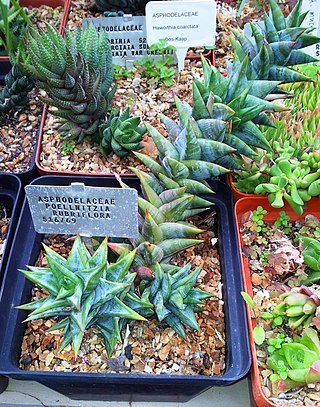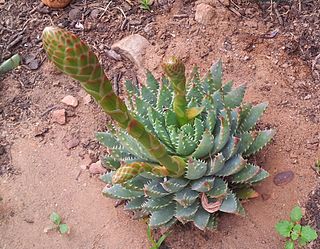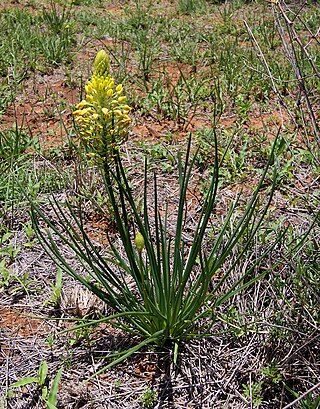
Valeriana rubra, the red valerian, spur valerian, kiss-me-quick, fox's brush, devil's beard or Jupiter's beard, is a popular garden plant grown for its ornamental flowers.

Leucadendron argenteum is an endangered plant species in the family Proteaceae, which is endemic to a small area of the Cape Peninsula, South Africa. Most grow in and around the city of Cape Town, but outlying populations exist near Somerset West (Silwerboomkloof), Paarl and Stellenbosch. It is a protected tree in South Africa.

Senecio barbertonicus, the Barberton groundsel or succulent bush senecio, is an evergreen succulent shrub of the family Asteraceae and genus Senecio, native to Southern Africa, named after one of its native localities Barberton and is now also being cultivated elsewhere for its drought resistance, clusters of sweetly scented, golden-yellow, tufted flower heads in winter and attractiveness to butterflies, the painted lady butterfly in particular.

The giant plated lizard is a lizard in the family Gerrhosauridae, which is found in dry to mesic habitats of southern Africa. They are wary and stay close to their rocky retreats.

Astroloba rubriflora is a succulent plant found in the mountainous Karoo area around Robertson, South Africa. It is listed as a Vulnerable species on the IUCN global Red List.

Bulbine frutescens, the wild kopieva or stalked bulbine, is a species of flowering plant in the genus Bulbine, native to southern Africa.

Pigeon Valley is a Natural Heritage Park and formally declared municipal nature reserve in Durban, South Africa. It is an unusual example of an urban reserve with very high levels of biodiversity. It was established to provide protection for the Natal elm and other forest giants of the coastal climax forest. Another rare tree that occurs here is Natal forest loquat, which is endemic to the Durban area and to oNgoye Forest.

Aloe brevifolia, the short-leaved aloe, is a species of flowering plant in the family Asphodelaceae. It is a tiny, compact, blue-green evergreen succulent perennial, that is native to the Western Cape, South Africa. Listed as Endangered on SANBI's Red List, it is threatened in its natural habitat, but is also widely popular as an ornamental plant in rockeries and desert gardens worldwide.

Smilax anceps is a vigorous scrambling vine or shrub, and is one of some 278 species in the genus Smilax in the family Smilacaceae. The species is widespread in Tropical Africa, Southern Africa, Réunion, Mauritius, Comoros, and Madagascar. The specific name 'anceps' is Latin for 'dangerous', a caution against the hooked prickles. Tarundia cinctipennis Stål, 1862, a hemipteran insect, is associated with this plant.
The South African National Biodiversity Institute (SANBI) is an organisation tasked with research and dissemination of information on biodiversity, and legally mandated to contribute to the management of the country's biodiversity resources.

Scutia myrtina is a species of plant in the family Rhamnaceae. It is commonly known as cat-thorn.

Bulbostylis hispidula is a plant native to South Africa, Eswatini, Botswana, and Namibia. The subspecies pyriformis can be found in all South African provinces except Western Cape. On the SANBI Red List, it is listed as "safe" (LC).

Drypetes gerrardii is a species of small tree or large shrub in the family Putranjivaceae. Common names include forest ironplum, bastard white ironwood, and forest ironwood. It is native to tropical and subtropical central and eastern Africa. It was first described in 1920 by the English botanist John Hutchinson, who named it after the English botanist William Tyrer Gerrard who collected plants and seeds in southern Africa in the 1860s.

Bulbine abyssinica is a species of plant in the genus Bulbine, from eastern and southern Africa.

Cyanella lutea is a species of cormous herb, native to South Africa and southern Namibia, where it grows in clay-rich or loamy soils.

Asparagus mucronatus ("Katdoring") is a thorny shrub or creeper of the Asparagus genus, that is indigenous to the southern Cape regions of South Africa.

Protea venusta, the cascade sugarbush or creeping beauty, is a flower-bearing shrub belonging to the genus Protea. It is endemic to South Africa.

Larryleachia perlata is a species of flowering plant the family Apocynaceae. The species is a succulent plant species. The species is considered an insufficiently known species.

Lachenalia unifolia, the banded viooltjie, is the most common Lachenalia species in the Cape Floristic Region of South Africa.

















